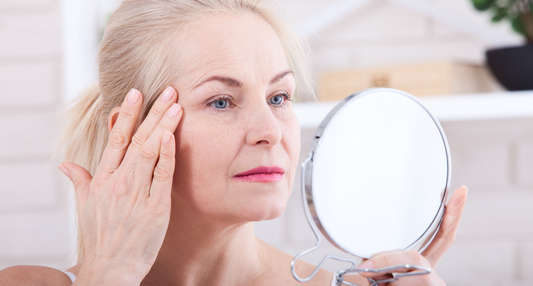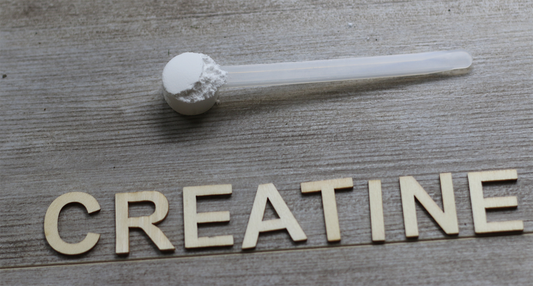How To Care For Skin Changes During Menopause

Share
It’s not your imagination! Our skin is changing during menopause, accelerating the aging process faster than anything you’ve experienced up to this point. It’s all because menopause reduces the amount of estrogen in our bloodstream, which leads to lower blood flow to the skin affecting nutrient delivery and wound healing and decreasing collagen levels. We can expect to lose 30% of our collagen in the first 5 years of our menopause. The result of this is more wrinkled, saggy, sallow and dry skin.
The good news is, there are anti-aging skincare ingredients like Vitamins A, B, and C that can help reverse skin changes during menopause and improve your skin’s overall appearance. In addition, Hormone Replacement Therapy (HRT) can also help with skin aging. Let’s dive into how HRT can help reverse the skin aging process and some alternatives that might help if you can’t take HRT such as estrogen replacement and topical estrogen-like compounds.
How Hormone Replacement Therapy Can Reverse Skin Aging During Menopause
Hormone Replacement Therapy (HRT) can help reduce many symptoms that those with menopause experience, including skin aging.
In fact, HRT works so well that premenopausal levels of collagen could be maintained. And subsequent studies have also shown a benefit in skin hydration, skin elasticity, wrinkling, and wound healing with HRT. These benefits occur whether the estrogen is delivered orally, transdermally or topically.
It’s always important to talk to your medical provider to determine if HRT is right for you. HRT should not be given solely for cosmetic reasons and shouldn’t be prescribed long term for treating skin disorders, While there are many benefits HRT can do to reduce menopausal symptoms such as hot flashes, vaginal dryness, and other menopausal symptoms, HRT may have side effects that require you and your healthcare provider to consider before beginning HFT treatment.
Here Are 3 HRT Alternatives That Can Fight Against Aging In The Skin
1. Selective Estrogen Receptor Modulators (SERMS)
Tamoxifen and raloxifene can improve wound healing in older adults and also help with increasing bone density from osteoporosis and can prevent breast cancer.
2. Phytoestrogens (Isoflavones)
While these might not be as effective as other SERMS, these are plant-based SERMS that have recently become more prominent. Phytoestrogens in soy can improve menopausal skin from both oral and topical form.
3. Methyl Estradiol Propanoate (MEP)
This non-hormonal estrogen receptor activator works by activating the estrogen receptors in your skin cells. MEP metabolizes within the skin and has been reported to reduce the dryness, atrophy and dullness of menopausal skin.
Treatments and ingredients such as Vitamin A, B, and C, Hormone Replacement Therapy and non-hormonal treatments, can revive the skin, reduce aging effects and ultimately relieve other symptoms related to menopause. It’s important to talk with your healthcare provider to discuss the different options and treatments, depending on your history, needs, and wants so you can feel like your best self.










